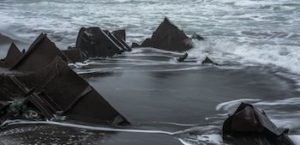
Clotilda's remains
*On this date in 1860, the last American slave ship (on record) docked in Mobile, Alabama.
Called the Clotilda, the ship was a two-massed schooner, 86 feet (26 m) long with a beam of 23 feet. (7.0 m). The ship arrived at Mobile Bay with 110-160 Black captives from Africa to the United States. The Clotilda was under the command of white Captain William Foster, who was working for Timothy Meaher, a wealthy white Mobile shipyard owner who had built Clotilda in 1856.
Oral history mentions that Meaher bet some "Northern gentlemen" based in New England, who provided the financing for the illegal venture, that he could defy the 1807 Act Prohibiting Importation of Slaves without getting caught. Meaher had learned that West African tribes were fighting and that the King of Dahomey was willing to trade Africans for the U.S. $50 each in the Kingdom of Whydah, Dahomey. Foster arrived in Whydah on May 15, 1859, bought Africans from several tribes, and returned to America.
When Clotilda arrived in the U.S., federal authorities were alerted to the illegal scheme. Fearful of criminal charges, Captain Foster arrived at the port at night, transferred his cargo to a riverboat, and then burned Clotilda before sinking it. The African slaves were distributed to the investors in the Clotilda venture, with Meaher retaining 30 Africans on his property near Mobile. Cudjo (aka Cudjoe) Lewis was among the 30 held by Meaher. Mobile was in the Deep South, and Blacks, whether Africans or native-born, were enslaved or treated as chattel.
The American Civil War began the following year and ended in 1863 after the illegal enslavement of the Africans brought aboard Clotilda. When freed, the Africans settled at Magazine Point, just north of Mobile, calling their community Africatown. They adopted their laws and leaders and established the African Church. The community worked diligently: the women used their agricultural skills to raise and sell crops, and the men worked in mills for $1 a day, saving money to purchase the land. They avoided whites as much as possible.
One of the last African slave survivors of the Clotilda middle passage was Kazoola, who became Cudjo Lewis. In 1927, Zora Neale Hurston, the African American writer, interviewed Lewis for the Journal of Negro History and made a short film of him. During interviews, Lewis talked about the civil wars in West Africa, in which members of the losing side were sold into slavery to Africans and Europeans. His tribe was the Tarkars of West Africa. Cudjo related how he had been captured by warriors from neighboring Dahomey, taken into Whydah, and imprisoned within a slave compound. He had been sold by the King of Dahomey to William Foster and then transported to America.
After the American Civil War, the Tarkar people asked the U.S. government to repatriate them, but they were denied. They then tried to recreate a homeland in Mobile. They continued speaking their native language and used African gardening or cooking techniques to retain their West African culture. Lewis served as a spokesman for the Tarkar people of Africatown for several years. He was visited by many prominent blacks, among them Booker T. Washington. Lewis eventually believed that Africans had to adopt the new country amid the brutal brutality of slavery and segregation. Cudjo Lewis died in 1935 at 94, and Redoshi Smith died in 1937. The last known Clotilda survivor of the middle passage to America was Matilda Mccrear, who died in Selma, Alabama, in January 1940, aged 83.
Many descendants of Lewis still reside in Africatown, a neighborhood of Mobile, Alabama. In Africatown, the Union Baptist Church has the Cudjo Lewis Memorial Statue. In 1997, descendants and friends mounted a campaign to have the community designated as a historical site. Because Captain Foster burned and sank the ship upon arrival in Mobile Bay, archaeological searches continued for the wreck of the Clotilda in the bay. In 2018, a reporter for al.com claimed to have discovered the wreck of the Clotilda in the lower Mobile-Tensaw Delta, a few miles north of Mobile, Alabama. The discovery was enabled by record low tides caused by the same storm system that caused the January 2018 North American blizzard.